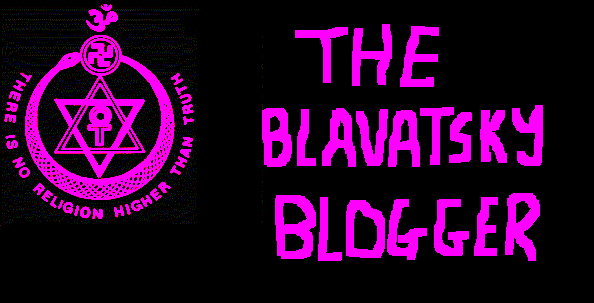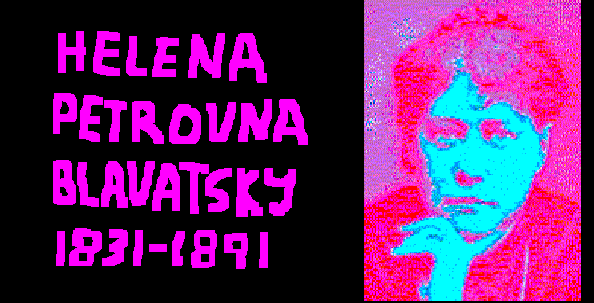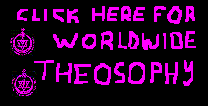Blavatsky Blogger

Taking Theosophical
ideas
into the 21st
century

Family
Karma
Don’t
Read this if you are a Traditional Values Reactionary
Posted
Do you
ever look at your life and feel that you have inherited something that isn’t
yours and quite simply doesn’t fit your true nature to such an extent that you
are constantly struggling against it (e.g. authoritarianism, stinginess, living
in the past or selling yourself short )?
When you
were at school, did you ever feel that in some subtle inexplicable way, your
family or the members of the family structure you were brought up in were
different from that of others?
Is there a
family way of thinking or tradition that you are constantly trying to
disassociate yourself from?
Are you
the “Black Sheep” of the family, ostracized by relatives who don’t approve of
you?
Modern
theories about all this tend to work on heredity and environment. You inherit
genetic traits from you ancestors (not just parents) and how you turn out is
the result of the combination of these traits mixed with social experience and
character moulding provided mainly by your family.
Your family may provide offspring with a “one size fits nobody” upbringing
which can become a bone of contention for the rest of your life.
These
ideas work well enough but I believe that the hold the family has over you
sometimes goes much further than this with a more oppressive hold than most of
us realize at a conscious level. You don’t get out of this even if you grow up
in on a modern flexible family structure although the rules change a bit,
making it less oppressive for some.
You have
your Karma (good or bad) to deal with but Annie Besant here adds another
dimension to the equation with the concept of Family Karma.
Please
note that Annie Besant was writing at a time (1917) when the term “family”
referred to the traditional structure and I believe that a reaction to the
oppressive Karmic hold of this structure has contributed to the decline of the
traditional family.
___________________
___________________
Extracts from A Study
in Karma
By
Annie Besant 1917
Family
Karma
Let us
consider the collective karma of a family. The family has a thought-atmosphere
of its own, into the colouring of which enter family
traditions and customs, family ways of regarding the
external world, family pride in the past, a strong sense of family honour. All the
thought-forms of a member of the family will be influenced by these conditions,
built up perhaps through hundreds of years, and shaping, moulding,
colouring, all the thoughts, desires and activities
of the individual newly born into it. Tendencies in him that conflict with
family traditions will be suppressed, all unconsciously to him; the things “a
fellow cannot do” will have for him no attraction; he will be lifted above
various temptations, and the seeds of evil which such temptations might have vivified
in him will quietly atrophy away.
The
collective karma of the family will provide him with opportunities for
distinction, open out avenues of usefulness, bring him advantages in the
struggle for life, and ensure his success. How has he come into conditions so favourable? It may be by a personal tie with some one
already there, a service rendered in a previous life, a bond of affection, an
unexhausted relationship.
This
avails to draw him into the circle, and he then profits by the various karmic
results which belong to the family in virtue of its collective past, of the
courage, ability, usefulness of some of its members, that have left an
inheritance of social consideration as a family heirloom.
Where the family
karma is bad the individual born into it suffers, as in the former case he
profits, and the collective karma hinders, as in the former
instance it promoted, his welfare.
___________________
___________________
If the power of the traditional family
(clearly defined here in terms of the perpetuated male line and with an
emphasis only on positive attributes) is so far reaching and you are encumbered
a dominating “thought atmosphere” and with Karma generated by ancestors who
died possibly hundreds of years before you were born, then it is perhaps not
surprising that so many have rejected the traditional family unit. This
rejection has been at a subtle, emotional and intellectual level and runs far
deeper than the extension of sixties hip-groovy attitudes that some traditional
values reactionaries claim it to be.
Unfortunately you don’t escape the pull
of Family Karma by being born into a less structured arrangement but things can
be easier. You still inherit a bundle of Karma from your ancestors, the
difference is that whereas in the traditional family, you only have the one
outfit to deal with, in a more flexible set up, you will have a choice from the
various strands of your ancestry. The “collective past” broadens from the point
of view of Karmic inheritance. The “thought atmosphere” will be more of an
aggregate of the inherited traditions and more flexible.
How this choice is made will be
determined by your affinities with the members of your family structure. You
will naturally gravitate towards certain people and by doing this inherit their
Karma. The down side to this is that your grouping may be dominated by certain
forceful people (or one dominant person) who have a
disproportionate influence on you, taking you Karmically
back to square one.
Of course changes have taken place
within the notion of the traditional family, which make being in a family a
much more laid back and less intense affair. The concept of family portrayed
here by Annie Besant is now rare, familiar to Poet Phillip Larkin but alien to
the average 15 year old. This, I believe is the also the result of a need to
break the Karmic hold of the family, meeting it half way.
Some argue that there are social and career
advantages in the traditional family and have figures to prove it. The decline
of the traditional family, however, only goes back forty years and society has
not yet assimilated such a massive change in such a short time. The mould has
been broken and I don’t see us going back to the 1950s. It is of course
probable that at some stage in the distant future, the
cyclic nature of history will bring about a change.
What’s the Karmic Bill for
all this
Annie Besant
optimistically describes considerable benefits associated with membership of a
very privileged family which clearly knocks its members into shape. Family
members are only permitted to reach their potential on strict family terms. You
could also be in a family like this with no specifically bad Karma but also
none of the benefits outlined.
The oppressive nature of
being born into a family with bad Karma is pretty obvious and it is logical
that you are just as likely to be born into a bad Karma family as a good Karma
one.
As I see it, if you are in
a less formal family or family structure coupled with less commitment to any
family tradition, then the Karmic pluses and minuses will be less than if you
were in the sort of outfit described by Annie Besant.
Going one stage further
and cutting oneself off altogether from all family commitments and obligations
is not a viable option according to H P Blavatsky who warns that self isolationism
as a means to avoid Family or Group Karma will not work.
She says in The Key To Theosophy
“In reality, there is no
such thing as “Separateness”; and the nearest approach to that selfish state,
which the laws of life permit, is in the intent or motive.”
As we now live in an
aspirational society which prizes the goal of self realization highly, the use
of the term “selfish state” seems to hark back to a time when everyone was
supposed to know their place and be satisfied with it. Indeed if nobody had
ever made any move to the break away from the Group Karmic forces which affected
them, then we would still live in a feudal agrarian economy. H P Blavatsky is
making the point here that one never acts alone in Karmic terms, and to believe
that one can, is arrogant and futile.
Looking Forward
We won’t escape the Law of
Karma and if Family Karma becomes less important then other forms of Group
Karma will be tracking us down. We will just have to keep looking over our
shoulders.
A Study in Karma By Annie Besant
______________________
The Blavatsky
Blogger
Taking Theosophical
ideas
into the 21st
century
__________________________
Postings
to this Website reflect
the views of The Blavatsky Blogger.
Please
don’t go looking for anyone else.

